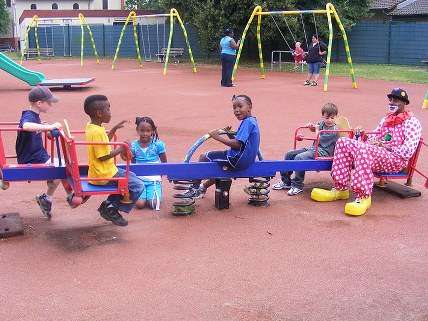Abolish the Family? Or Just Hobble Parents So They Don't Give Kids 'Unfair' Advantages?
"Harrison Bergeron" was not intended as a how-to manual

If you need further evidence that egalitarianism is off the rails, down the rabbit hole, or just batshit insane, check out the profile at Australia's ABC of two British political philosophers who fret that good parenting is giving some kids an "unfair" advantage over kids with crappy parents. I shit you not.
It's praiseworthy to want to improve opportunity for kids—kudos to everybody who wants children to be better treated, better educated, better fed… Who doesn't want that? But perverting those concerns, so that rather than looking for ways to expand choices and raise the floor you're going full Handicapper General and trying to hobble anybody who rises above the crowd a bit produces quotes like this gem from Prof. Adam Swift of the University of Warwick:
"One way philosophers might think about solving the social justice problem would be by simply abolishing the family. If the family is this source of unfairness in society then it looks plausible to think that if we abolished the family there would be a more level playing field."
There's probably nothing "simply" about abolishing the family, unless you want to march all the way down the communitarian road to Plato's Retreat and Reeducation Camp. Swift (seemingly grudgingly) concedes this point, noting "nearly everyone who has thought about this would conclude that it is a really bad idea to be raised by state institutions, unless something has gone wrong." But he and his colleague Harry Brighouse, of the University of Wisconsin, Madison, do a lot of "thinking about what it was we wanted to allow parents to do for their children, and what it was that we didn't need to allow parents to do for their children, if allowing those activities would create unfairnesses for other people's children."
Top of the list of things parents ought not be allowed to do is send their kids to private school. Add to this "inheritance and other predominantly economic ways of conferring advantage." Their whole take on permissible family activity has been extended to book length in 2014's Family Values: The Ethics of Family-Child Relationships, which "explain why a child's interest in autonomy severely limits parents' right to shape their children's values, and why parents have no fundamental right to confer wealth or advantage on their children."
Oh—in case you're wondering, reading bedtime stories to your kid is OK, even though it confers a bigger advantage than private schooling. Fortunately (whew!) it's among the "kinds of interactions between parents and children that do indeed foster and produce these [desired] familial relationship goods."
Admittedly, academics who want to reshape society in some perfect image and lack only (drat!) a good secret police force to make it happen are a dime a dozen. But we live in the age of Piketty and other handwringers over the dread scourge of inequality. "It's just not fair" is the battle cry of those who would challenge libertarian preferences for freeing people to achieve their potentials and follow their dreams. Swift, Brighouse, and their ilk would have us trade the freedom to try and fail with our various advantages and disadvantages for an imposed Harrison Bergeron-esque fairness that could never truly root out inequality, not just because people aren't uniform factory products, but because you're never going to get them to cooperate.
Ban private schooling? And what will you do then about the inevitable weekend tutors and online lessons. Outlaw inheritance? Watch large family fortunes flee into offshore trusts and small ones turn into bundles of cash and jewelry.
That's what I would do, and I doubt I'd be the only gleeful scofflaw.
And then we'll need some more equalizing enforcement to eradicate that cursed unfairness. Once it goes beyond equality before the law, equal liberty for all, egalitarianism always runs up against a major problem: It needs people with guns to impose it on the unwilling, and even then they need escalating powers to scrutinize and intrude.
Swift and Brighouse are unlikely to get those guns and powers any time soon, I'm happy to say. But they're not the only would-be reshapers of our lives hanging around.


Show Comments (269)